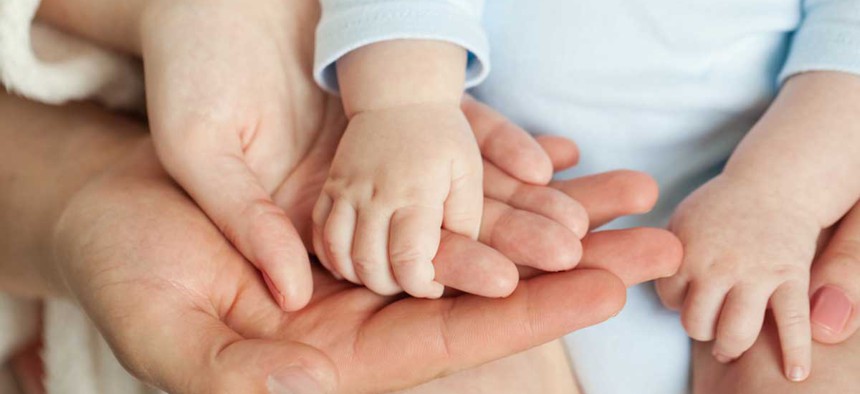
Iryna Prokofieva/Shutterstock.com
Everyone Could Benefit From Paid Parental Leave
Workplaces are (slowly) becoming more equal. Yet many have policies that all but ensure that households will stay stuck in the past.
While women have made significant headway when it comes professional equality, a shift of a similar magnitude hasn’t happened on the home front: Traditional gender roles persist at home, despite many couples’ best efforts to divide the work more equally. As Anne Marie Slaughter told my colleague Becca Rosen, men who take on the role of primary caregiver are often stigmatized rather than lauded. Richard Reeves and Isabel Sawhill, economists at the Brookings Institution second this theory in a recent piece in The New York Times, writing, “The gender revolution has been a one-sided effort. We have not pushed hard enough to put men in traditionally female roles—that is where our priority should lie now.”
For gender equality to work, men need to take on these roles as often and as enthusiastically as women do. But that’s been a slow transition. In a 2013 articleAlexis Madrigal, suggested that fear, time, and stigma, play a big part in preventing men from making the effort necessary to learn how to be a child’s main caretaker. I recognize the fear Madrigal is talking about. When my niece was only about a week old, my brother had to head back to work. I showed up to help my sister-in-law out. One evening my brother came home and took to his nightly routine of hanging out with his new daughter. But she wouldn’t stop crying. After his arsenal of tried-and-true baby-calming techniques failed he just stared at his crying infant. After seeing this, his wife came taking the baby into another room to try to calm her. I laughingly asked my brother what baby-soothing strategy he had just employed, baby telepathy perhaps. He half-smiled, shook his head and said, “I just didn’t know what to do.”
“If you’re only gonna be out of work for two weeks, what’s the point in working through the hard parts of figuring out a child? It’s much easier to just pass the kid back to Mom and let her deal with it,” Madrigal wrote. But because he stayed home for nine weeks, he had both time and incentive to figure out the things that originally flustered him: how to efficiently change a baby, feed a baby, and soothe a seemingly inconsolable baby. My brother, too, has figured it out and is now just as likely to be the one taking care of both big and small parenting tasks as his wife is. Research suggests that young dads do in fact want to take time off and be more active participants in caregiving. But when men don’t, either because of lack of opportunity or lack of desire, those tasks continue to fall to women, whose careers suffer as a result.
Getting comfortable in the role of caregiver is huge not just for parental confidence, but for families as a whole. Studies have also shown that dads who get involved in taking care of their children early on wind up being more involved going forward. And for households seeking equal partnership both professionally and personally, being able to trade off on the role of primary caretaker is critical. Without paternity leave, dads face a major hurdle in being equal partners at home, even if they want to be.
Yet between 2010 and 2014, the share of firms offering paternity leave actually dropped, according to Slaughter’s research. What would happen if men had more opportunities to sharpen their caregiving skills?
A new paper from the National Bureau of Economic Research suggests that when given paid leave, many men will be more willing than expected to jump into the role of caregiver.
The study looks at the changes in paternal leave taking after the implementation of California’s paid family leave policy in 2004. Researchers found that once dads were eligible, they were 46 percent more likely to take time off for a new baby, and they took longer leaves. But perhaps most significantly, the number of men who took leave while their wives returned to work climbed by 50 percent. “The increase in father-only leave-taking means that providing CAPFL to fathers—in addition to mothers—increases the total number of days that at least one parent stays home with the infant,” the researchers found.
The increase of father-only leave time is especially important when it comes to considering the gender-wage gap, which grows for each group of women around the time that they start taking leave from work in order to care for new babies, and their male colleagues, traditionally, don’t. In order to close that gap, both policy and male partners need to embrace change.
(Image via Iryna Prokofieva/Shutterstock.com)






